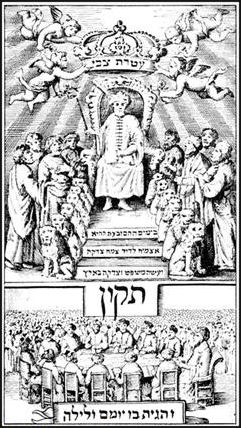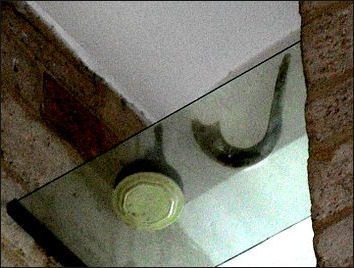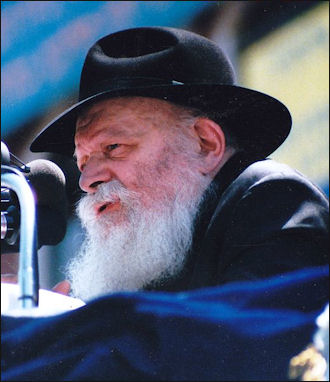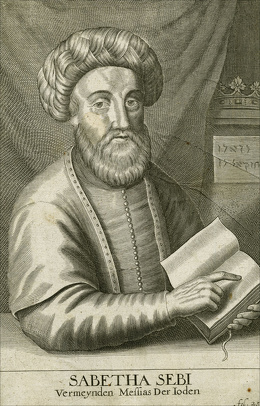Home | Category: Judaism Beliefs
JEWISH MESSIAH

Medieval vision of the
coming of the Jewish Messiah Religious Jews believe The Messiah will come. The word messiah is an English version of the Hebrew word moshiach, which means "anointed." Jews believe that God will appoint a messiah who will end evil, rebuild the Temple, and return exiles to Israel. (Jews frequently refer to the Diaspora, or the scattering of Jews throughout the world). Judaism's split with Christianity came about primarily because of this belief. Christians believe that Jesus Christ was the Messiah, while Jews do not. The dead will be resurrected in the "Time to Come," or in Hebrew, Olam Ha-Ba, the afterlife. [Source: Encyclopedia.com]
In Judaism, the Messiah is expected to the deliverer and king of the Jews as foretold by the prophets of the Old Testament. Jews believe that a Messiah will come to Earth and resurrect the dead, reward the faithful, perhaps taking them away to some paradise or building a paradise on Earth. They believe the Messiah is a god and descendant of David who will come to Earth in the form of a man. Messiah means "anointed one." This term dates back to the time of David when kings were anointed to show their divine election. 2 Samuel states: “great triumph He gives to His king, and shows steadfast love to His anointed.”
While the Temple stood in Jerusalem, the messiahs were the kings of Israel. David and Solomon were all referred to as messiahs, which scholars say suggests that messiah originally meant person with great holiness or religious power. There is some controversy among scholars as to whether “messiah” means "spiritual savior" or "military savior."
After the First Temple was destroyed, the Jewish kingdom was conquered and the Jews were driven from Israel, ideas took root that a new kind of messiah would return to Earth and restore the Temple and bring the Jews back to their homeland in Israel. These ideas became strong when the Second Temple was destroyed and Jews were dispersed around the world, Over time the return of the Messiah came to embrace a larger meaning: the ending of war, the killing of the wicked, the establishment of a covenant with the righteous and the creation of God’s kingdom on Earth.
From the Gospels it appear that Jesus considered himself to be, and was considered by many Jews to be, the Jewish Messiah but was dismissed by Jews as a messiah after he died at the hands of the Romans instead of taking the Jews to heaven. Historians have asserted the Messianic speculation is highest when “anti-religious pressures are at their most acute”. Dead Sea scrolls give an indication of the messianic expectations and frenzy that existed in Palestine around the time Christ was born.
Passages about the belief that a day would eventually dawn when God's kingdom would be established over all the earth and war would be banished can be found in Isa. 2:1–4; 11:1–10; Micah 4:1–4; Zech. 14:9). Passages about the hope of national restoration under a Davidic ruler, later called the Messiah, and the resurrection of the dead, after the destruction of the Temple and the exile of the people to Babylon, can be found at Dan. 12:2. [Source: Louis Jacobs, Encyclopaedia Judaica, 1990s, Encyclopedia.com]
See Separate Article: JESUS, THE MESSIAH AND CHRISTIANITY africame.factsanddetails.com
Websites and Resources: Virtual Jewish Library jewishvirtuallibrary.org/index ; Judaism101 jewfaq.org ; torah.org torah.org ; Chabad,org chabad.org/library/bible ; BBC - Religion: Judaism bbc.co.uk/religion/religions/judaism ; Encyclopædia Britannica, britannica.com/topic/Judaism; Yivo Institute of Jewish Research yivoinstitute.org ; Internet Jewish History Sourcebook sourcebooks.fordham.edu ; Aish.com aish.com ; Jewish Museum London jewishmuseum.org.uk
RECOMMENDED BOOKS:
“Judaism, the Messiah and Jewish Identity” by Aaron Dranoff Amazon.com ;
“The Messiah: Jewish Perspectives Through the Lens of Scripture, Talmud, History, and Ongoing Controversies” by Rabbi Yaakov HaLevi Amazon.com ;
“Essential Judaism: Updated Edition: A Complete Guide to Beliefs, Customs & Rituals”
by George Robinson Amazon.com ;
“Guide for the Perplexed” by Moses Maimonides, Andrea Giordani, et al. Amazon.com ;
“Living Judaism: The Complete Guide to Jewish Belief, Tradition, and Practice”
by Wayne D. Dosick Amazon.com ;
“Judaism: History, Belief and Practice” by Dan Cohn-Sherbok Amazon.com ;
“Living a Jewish Life: Jewish Traditions, Customs, and Values for Today's Families” by Anita Diamant, Howard Cooper, et al. Amazon.com ;
“To Be a Jew Today: A New Guide to God, Israel, and the Jewish People”
by Noah Feldman Amazon.com ;
“A History of the Jews” by Paul Johnson, Amazon.com
Coming of the Messiah

Oil and Shofar for the Messiah
at Yochanan ben Zakai Synagogue
in Old Jerusalem Jews look forward to the coming of what some call the True Messiah. They believe his coming will be preceded by the rise and fall of a terrible Hitler-like tyrant and cataclysmic upheaval.
When the true Messiah does come, it is written it will take place on a Friday night or a Saturday. He will come down off the Mount of Olives and stop first at Mount Meron in the Galilee Hills and from there he will pass through Zefat on his way to Jerusalem where he will arrive through the Golden Gate (the Hebrew Gate), heralded by prophet Elijah. According to the prophet Zachariah he will enter his kingdom “meek and riding on an ass.”
When this occurs observant Jews will return to Israel to live in a state of holiness and establish a new world order. Gentiles will recognize the Messiah and submit to Jewish masters. A Third Temple will be built and all the Jews who lived in exile will rise in Jerusalem.
Jews have speculated that the Messiah will arriver around the year 6000 on the Jewish calendar, which is the year 2240 on the Gregorian calendar. Some Jews think the Messiah it could arrive at any time. Some Jews even go to sleep with their bags packed in case the Messiah shows up while they are sleeping. Other claim his return will be delayed due to the failure of the Jewish people to repent for their transgressions and the favors given the Jews by Gentiles.
In modern times, expectation on the arrival of the Messiah have diminished somewhat. Some Jews believe that establishment of Israel has become a sort of substitute for the Messiah. Others saw that a true state of Israel can not exist until the Messiah arrives. A handful of ultra-Orthodox Jewish sects have heralded their leaders as messiahs.
In Israel, there is a group that is dedicated to reestablishing the priestly caste when the Messiah comes and rebuilding the Temple. Jews there have also set up an important mystical center in Zefat to welcome the Messiah. When Muslim ruled Jerusalem the Hebrew Gate was blocked with stones to bar the Messiah's arrival.
See Separate Article: UNREST AND JEWISH BANDIT-GUERRILLAS DURING JESUS' TIME europe.factsanddetails.com
Resurrection, End of the World and the Messiah
The Jewish concept of afterlife is closely tied with the coming of the Messiah and the end of the world. A prevalent view among Jews, which dates back primarily to the Middle Ages, is that when the Messiah comes the dead will be resurrected and reunited with their bodies in a paradise-like kingdom of God near Jerusalem. Afterwards there will be a judgment in which the wicked will be destroyed forever and the faithful will exist with God forever in a bodiless state.
The concept of disaster followed by redemption help the Jews survive as a people and was the cornerstone of beliefs about a messiah.
According to Enoch 5:7-9, “But for the elect there shall be light and grace and peace, and they shall inherit the earth...And their lives shall be increased in peace. And the years of their joy shall be multiplied, in eternal gladness and peace, all the days of their life.”
Development of the Idea of the Jewish Messiah
J.M Oesterreicher wrote in the New Catholic Encyclopedia: The Prophets had seen the past as herald of the future: the Exodus of old foretelling a new exodus, the reign of David, that of another David (e.g., Is ch. 35; Jer 23.5–6). As time went on, some in Israel looked for a new priest to bring blessing to the people or for a righteous leader who would himself be a source of righteousness. Many others dreamed of a mighty deliverer who would free them from pagan tyranny. Whereas the majority of the people expected a Warrior-Messiah, a scattered few longed for the Chosen One, hidden in God's presence since the beginning of the world and before it, who would soon come in the likeness of a man, yet bearing a face "full of graciousness, like one of the holy angels" (1 Enoch 46.1). [Source: J.M Oesterreicher, New Catholic Encyclopedia, 1960s, Encyclopedia.com]
For a long time the glittering magic and morbid sensuousness pervading so much of pagan fantasy about the afterlife had kept Israel from a fuller understanding of the world and life to come. In the centuries preceding the coming of Jesus, however, the hope in a blessed immortality, the bodily resurrection of the just and their share in God's triumph and reign, erupted in many hearts (see resurrection of the dead). Full force was given to the Isaian words: "Your dead shall live, their corpses rise; awake and sing, you who lie in the dust" (26.19).
First Messiah in the Bible — Cyrus the Great of Persia
The first messiah in the Bible is no less than Cyrus the Great of Persia. Candida Moss wrote in the Daily Beast: Cyrus, unlike Babylonian rulers, had a more magnanimous and PR-savvy style of leadership. His conquest of Babylon led to the return of exiled Jews to their homeland, the rebuilding of the Temple in Jerusalem, and even the collecting together of ancestral texts into the Torah—the first five books of the Bible. Jews were grateful for his generosity—so grateful that one biblical author calls Cyrus the Messiah and presents him as a God-given savior figure.[Source: Candida Moss, Daily Beast, September 29, 2018]
Cyrus’ rule of the conquered territories relied as much on personal propaganda as it did on military power. He deposited a declaration, known as the Cyrus Cylinder, in the Temple of Marduk (the god of the city of Babylon), in which he declared that he was the chosen one of Marduk. According to Cyrus, the Babylonian king was impious and Cyrus’ victory was desired by Marduk himself. It was an impressive piece of religio-political propaganda that portrayed Cyrus as a liberator who restored temples and repatriated exiled peoples.
The Cyrus Cylinder makes no mention of the Jews directly, but it does support the general idea that Cyrus was responsible for sending the Jews home from Babylonia. Repatriating conquered peoples was one of Cyrus’s strategies and, according to the biblical book of Ezra, it was Cyrus the Great who ended the exile in 538 B.C., the year after he had conquered Babylon.
What is most impressive is how Cyrus was able to use religious propaganda to present himself as liberator rather than conqueror. This strategy worked so well that conquered religious leaders adopted his perspective for themselves. It appears to have been effective with Jews as well. In the lengthy prophetic book attributed to the prophet Isaiah, the author explicitly states that Cyrus is God’s anointed: “Thus says the Lord to his Anointed (Messiah), to Cyrus whom I took by his right hand” (Isa 45:1). The overwhelming majority of scholars believe that the exquisite poetry that makes up Chapters 40—55 of Isaiah were written around the time of the return from exile and the years that followed. A number of sections of this work, called “Cyrus Songs” by modern scholars, seem to praise the victories of Cyrus and describe God’s role in facilitating his conquests.
This section of Isaiah, known in scholarly circles as “Second Isaiah” (to distinguish it from the writings of the earlier prophet Isaiah, who wrote in the eighth century B.C. and whose words are found in Isaiah 1–39) is especially important to Christians because it contains many of the central prophecies used as predictions of the Messiah. To the writers of the New Testament and Christians, of course, these prophecies are understood to be prophecies about Jesus. But Isaiah 45:1 is pretty explicit that the “anointed one” of God is actually Cyrus, the non-Jewish Persian king. An article in Harvard Theological Review by Lisbeth Fried, for example, argues that Second Isaiah was presenting Cyrus as a Davidic king and making a theological claim about the relationship between the God of Israel and the Persian king. “Instead of the Davidic monarch,” she writes, “it is now Cyrus for whom [God] subdues kings.” In this way Second Isaiah was part of the Persian propaganda machine and was intended “to facilitate local acceptance of the foreign ruler.”
In the opening of the biblical book of Ezra, Cyrus is quoted as declaring that “The Lord, the God of heaven, has given me all the kingdoms of the earth and has appointed me to build a Temple at Jerusalem in Judah” (Ezra 1:2). Some scholars, following Ezra, think that Cyrus, his delegates, and successors actually sponsored the rebuilding of the Temple as well as the assembly of the Torah. From the perspective of the Persians, their goal was to support a theocratic local government that would remain loyal to divinely-backed Persian monarchs. It was a system that worked with the priests of Marduk in Babylon, so why not the priests of the God of Abraham? If this theory is correct, it would mean that Cyrus was not only the Messiah proclaimed by Second Isaiah but, in practical terms, a pivotal figure in the rebuilding of the Templ
Sabbatai Zevi
Sabbatai Zevi (1626–1676) was an Ottoman Jewish mystic, false messiah and ordained rabbi from Smyrna (now İzmir, Turkey). Likely of Ashkenazi origin, he claimed to be the long-awaited Jewish Messiah and founded the Sabbatean movement. He was arrested in Istanbul and served time in several different prisons and tried for of fomenting sedition.
Jacob Kat wrote in the International Encyclopedia of the Social Sciences: Jewish tradition had foreseen a radical change in the status of religious law in the Messianic era. According to the widely held view, with the appearance of the Messiah the religious commandments would no longer be held binding. Throughout the Middle Ages, Messianic expectations evoked Messianic pretenders, but as they were quickly disproved, the possible implications for religious practice were not realized. Different, however, was Sabbatai Zevi, who from 1665 to 1666 succeeded in keeping all Jewry in suspenseful waiting for the final call. [Source: Jacob Kat, International Encyclopedia of the Social Sciences, Encyclopedia.com]
He introduced new religious rites and partook in forbidden food in order to demonstrate by deed the end of the old era and the commencement of the new. When called to account by the Turkish authorities for causing mass upheavals, Sabbatai Zevi, to save his life, converted to Islam. A number of his followers accepted this as a necessary stage in the process of redemption, and in the course of theological justification for the converted Messiah, heretical theologies arose which were linked with the prevailing dualistic doctrines of the cabala.
Hasidic Messiahism
These gave rise to a number of sects, some of which were syncretisms of Judaism and Islam and lived on the margin of Jewish society, while others, although remaining within the confines of the Jewish community, were of a heretical and even antinomian or nihilistic character. These groups led a more or less clandestine existence among Jews in Turkey, Poland, Bohemia, and Moravia, thus disrupting the age-old religious unity of the Jewish people.
Hasidics developed theological responses to the Holocaust, most significantly Menachem Mendel Schneerson (1902–94), head of the Lubavitcher, or Habad, branch of Hasidism. He viewed the Holocaust as the "birth pangs of the Messiah," the tribulations preceding Redemption, whose imminent advent was indicated by the "miraculous" birth of the State of Israel. The rabbi's messianic enthusiasm was expressed by his dedication to the spiritual "ingathering" of the exiled of Israel, which he pursued by establishing a worldwide program to instill in secularized and assimilated Jews a love of the Torah. Many of Rabbi Schneerson's followers believe that he himself was the longed-for Messiah, who, despite his death, will soon return as the manifest Redeemer of Israel and the world. [Source: Paul Mendes-Flohr Worldmark Encyclopedia of Religious Practices, 2000s, Encyclopedia.com]
See Separate Article: HASIDIC JEWS: HISTORY, BELIEFS, PRACTICES africame.factsanddetails.com
Belief That Rabbi Schneerson Was the Messiah

Rabbi Menachem Mendel Schneerson Menachem Mendel Schneerson was the seventh and last leader of Lubavitch. He died in Brooklyn in 1994. Many of his followers believed that he was the Messiah or kind of pre-Messiah. Jonathan Mahler wrote in the New York Times:When the rebbe was alive, just about every Lubavitcher was confident he was the messiah. Because all Lubavitchers consider the messianic era to be imminent, it stands to reason that every generation would believe that its particular rebbe might be the messiah. Even given this predisposition, though, the movement's faith in the messianic potential of Schneerson, who was childless, was always uncommonly strong. This was partly a matter of historical context. When the rebbe took the reins of the movement, the Jewish people had just survived the worst calamity in their 3,000-year history -- a propitious moment for them to be delivered from the sufferings of their exile. [Source: Jonathan Mahler, New York Times, September 21, 2003]
As the years passed, the Lubavitch community became increasingly convinced that their rebbe met all of the requirements, laid out by Maimonides, to be the Jewish messiah. Most significant was his emphasis on outreach. ''Maimonides said the messiah would be a Jewish leader who will 'repair the breaches,''' one messianic rabbi, Eli Cohen, told me, ''or fix that which is missing in Jewish observance, and that's what the rebbe did.'' World events -- specifically the fall of the Soviet Union, which had suppressed the practice of Judaism, and the struggle over Israel -- fanned the community's messianic flames.
See Separate Article: SATMARS AND LUBAVITCHERS — THE LARGEST HASIDIC SECTS africame.factsanddetails.com
Rabbi in 2017 Predicted a Messiah Would Come in 2022
In 2017, a rabbi in Israel predicted a messiah would come in 2022. Candida Moss wrote in the Daily Beast in 2017: In 2022, approximately five years from now, a new star will appear in the night sky. Scientifically speaking, the appearance of this nova is the product of the collision of two other astral bodies. And for six months this new star will — to the naked eye — be the brightest in the heavens. Given that this is the first time that people will be able to witness a moment like this without technology, it’s a significant event in human history, but it may be much more than that. According to one rabbi, this new star is a sign of the coming of the Messiah. [Source: Candida Moss, Daily Beast, January 22, 2017] .
Rabbi Yosef Berger, a rabbi of King David’s Tomb on Mount Zion, has proposed that the star is a fulfillment of a Biblical prophecy from the book of Numbers, in which a star precedes the arrival of an important military leader: “a star shall come out of Jacob, and a scepter shall rise out of Israel; it shall crush the borderlands of Moab, and the territory of all the Sethites” (NRSV Num 24:17)
The prophecy itself is significant because the speaker is not Moses, the Bible’s quintessential prophet, but Balaam, a historically attested outsider and foreigner. Jacqueline Vayntrub, a biblical studies professor at Brandeis University, told me, “The inclusion of a foreign prophet, Balaam, in a narrative history of Israel is puzzling. But when you realize that the story is about an important, well known foreign prophet who is blessing Israel, it makes a whole lot more sense. Moses, as Israel’s insider, of course wants the best for Israel; but even a famous foreign prophet blessing Israel, now that’s interesting.”
Image Sources: Wikimedia Commons
Text Sources: Internet Jewish History Sourcebook sourcebooks.fordham.edu; “World Religions” edited by Geoffrey Parrinder (Facts on File Publications, New York); “ Encyclopedia of the World’s Religions” edited by R.C. Zaehner (Barnes & Noble Books, 1959); “Old Testament Life and Literature” by Gerald A. Larue, New International Version (NIV) of The Bible, biblegateway.com; Wikipedia, National Geographic, BBC, New York Times, Washington Post, Los Angeles Times, Smithsonian magazine, Times of London, Library of Congress, The New Yorker, Reuters, AP, AFP, Lonely Planet Guides, and various books and other publications.
Last updated March 2024

